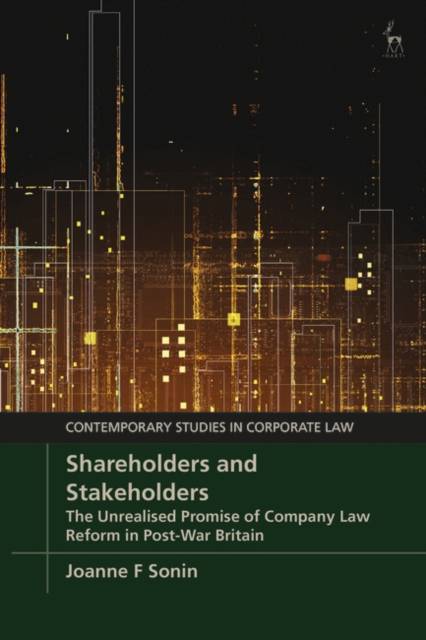
- Retrait gratuit dans votre magasin Club
- 7.000.000 titres dans notre catalogue
- Payer en toute sécurité
- Toujours un magasin près de chez vous
- Retrait gratuit dans votre magasin Club
- 7.000.0000 titres dans notre catalogue
- Payer en toute sécurité
- Toujours un magasin près de chez vous
Shareholders and Stakeholders
The Unrealised Promise of Company Law Reform in Post-War Britain
Joanne F Sonin
195,45 €
+ 390 points
Description
This book explores the evolution of the shareholder in post-war Britain within the context of changing legal, political, economic, and social conditions. It examines how the post-war transformation of the shareholder body influenced relationships amongst stakeholders, impacting corporate behaviour and the legal and political efforts to govern industry and financial markets.
The book addresses a number of themes, including: 1) how the movements for democratisation influenced the treatment of shareholder interests and the calls for stakeholder representation; 2) how the rhetoric of change created a narrative that deflected from the lack of systemic legal reforms and protected the status quo; 3) how, in the post-war consensus environment, political positions on equity ownership de-radicalised, which proved unsustainable against a background of increasing political polarisation and industrial unrest; and 4) how the institutionalisation of the post-war shareholder body had profound effects on industry, the financial markets, and the economy.
With these themes as a foundation, the evolutionary arch of the post-war shareholder is examined, focusing on developments that influenced the treatment and perception of shareholder and stakeholder interests, including nationalisations, shareholder democracy, corporate purpose, and industrial democracy.
The book further considers how these post-war changes contribute to the post-1979 legal treatment of shareholder and stakeholder interests, including subsequent changes to the Companies Act and the development of corporate governance codes. Parallels to contemporary movements for stakeholder capitalism, corporate purpose, and ESG are drawn.
The historical analysis of the post-war shareholder provides a framework for considering current questions on shareholder primacy and the demands for systemic legal reforms. These missed opportunities for meaningful changes to the treatment of shareholder interests in UK company law serve as useful precedents for evaluating subsequent periods.
The book addresses a number of themes, including: 1) how the movements for democratisation influenced the treatment of shareholder interests and the calls for stakeholder representation; 2) how the rhetoric of change created a narrative that deflected from the lack of systemic legal reforms and protected the status quo; 3) how, in the post-war consensus environment, political positions on equity ownership de-radicalised, which proved unsustainable against a background of increasing political polarisation and industrial unrest; and 4) how the institutionalisation of the post-war shareholder body had profound effects on industry, the financial markets, and the economy.
With these themes as a foundation, the evolutionary arch of the post-war shareholder is examined, focusing on developments that influenced the treatment and perception of shareholder and stakeholder interests, including nationalisations, shareholder democracy, corporate purpose, and industrial democracy.
The book further considers how these post-war changes contribute to the post-1979 legal treatment of shareholder and stakeholder interests, including subsequent changes to the Companies Act and the development of corporate governance codes. Parallels to contemporary movements for stakeholder capitalism, corporate purpose, and ESG are drawn.
The historical analysis of the post-war shareholder provides a framework for considering current questions on shareholder primacy and the demands for systemic legal reforms. These missed opportunities for meaningful changes to the treatment of shareholder interests in UK company law serve as useful precedents for evaluating subsequent periods.
Spécifications
Parties prenantes
- Auteur(s) :
- Editeur:
Contenu
- Nombre de pages :
- 328
- Langue:
- Anglais
- Collection :
Caractéristiques
- EAN:
- 9781509966806
- Date de parution :
- 07-09-23
- Format:
- Livre relié
- Format numérique:
- Genaaid
- Dimensions :
- 156 mm x 234 mm
- Poids :
- 639 g

Les avis
Nous publions uniquement les avis qui respectent les conditions requises. Consultez nos conditions pour les avis.






